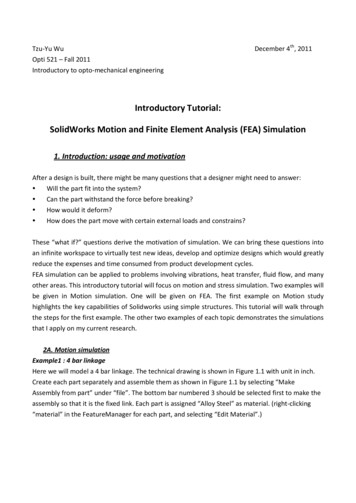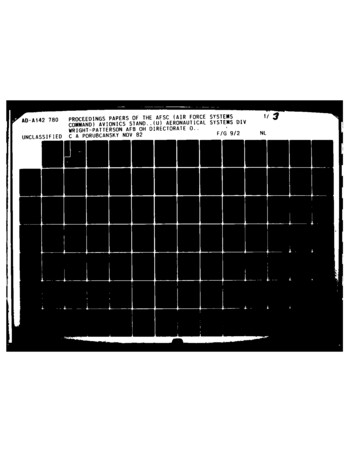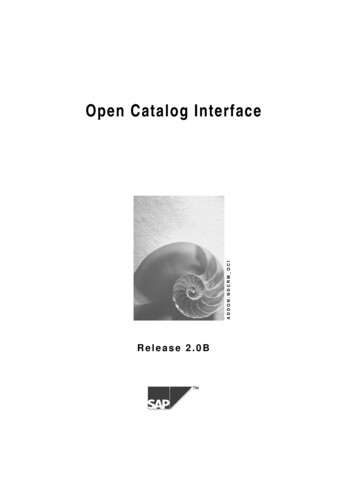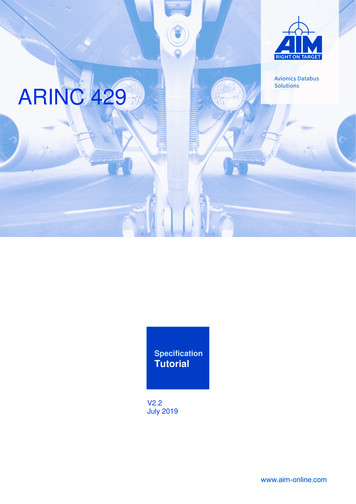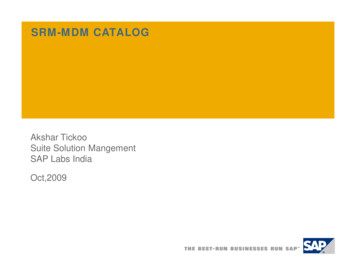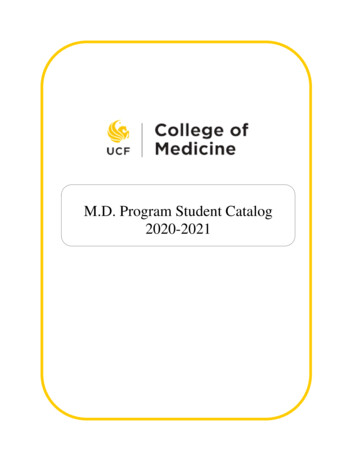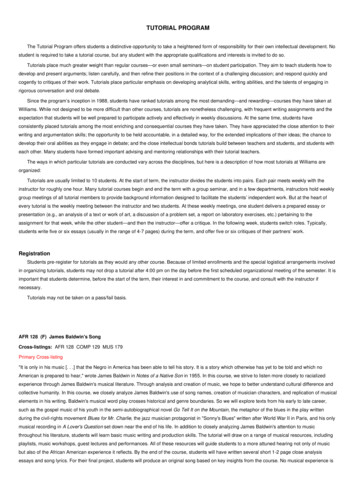
Transcription
TUTORIAL PROGRAMThe Tutorial Program offers students a distinctive opportunity to take a heightened form of responsibility for their own intellectual development. Nostudent is required to take a tutorial course, but any student with the appropriate qualifications and interests is invited to do so.Tutorials place much greater weight than regular courses—or even small seminars—on student participation. They aim to teach students how todevelop and present arguments; listen carefully, and then refine their positions in the context of a challenging discussion; and respond quickly andcogently to critiques of their work. Tutorials place particular emphasis on developing analytical skills, writing abilities, and the talents of engaging inrigorous conversation and oral debate.Since the program’s inception in 1988, students have ranked tutorials among the most demanding—and rewarding—courses they have taken atWilliams. While not designed to be more difficult than other courses, tutorials are nonetheless challenging, with frequent writing assignments and theexpectation that students will be well prepared to participate actively and effectively in weekly discussions. At the same time, students haveconsistently placed tutorials among the most enriching and consequential courses they have taken. They have appreciated the close attention to theirwriting and argumentation skills; the opportunity to be held accountable, in a detailed way, for the extended implications of their ideas; the chance todevelop their oral abilities as they engage in debate; and the close intellectual bonds tutorials build between teachers and students, and students witheach other. Many students have formed important advising and mentoring relationships with their tutorial teachers.The ways in which particular tutorials are conducted vary across the disciplines, but here is a description of how most tutorials at Williams areorganized:Tutorials are usually limited to 10 students. At the start of term, the instructor divides the students into pairs. Each pair meets weekly with theinstructor for roughly one hour. Many tutorial courses begin and end the term with a group seminar, and in a few departments, instructors hold weeklygroup meetings of all tutorial members to provide background information designed to facilitate the students’ independent work. But at the heart ofevery tutorial is the weekly meeting between the instructor and two students. At these weekly meetings, one student delivers a prepared essay orpresentation (e.g., an analysis of a text or work of art, a discussion of a problem set, a report on laboratory exercises, etc.) pertaining to theassignment for that week, while the other student—and then the instructor—offer a critique. In the following week, students switch roles. Typically,students write five or six essays (usually in the range of 4-7 pages) during the term, and offer five or six critiques of their partners’ work.RegistrationStudents pre-register for tutorials as they would any other course. Because of limited enrollments and the special logistical arrangements involvedin organizing tutorials, students may not drop a tutorial after 4:00 pm on the day before the first scheduled organizational meeting of the semester. It isimportant that students determine, before the start of the term, their interest in and commitment to the course, and consult with the instructor ifnecessary.Tutorials may not be taken on a pass/fail basis.AFR 128 (F) James Baldwin's SongCross-listings: AFR 128 COMP 129 MUS 179Primary Cross-listing"It is only in his music [. . .] that the Negro in America has been able to tell his story. It is a story which otherwise has yet to be told and which noAmerican is prepared to hear," wrote James Baldwin in Notes of a Native Son in 1955. In this course, we strive to listen more closely to racializedexperience through James Baldwin's musical literature. Through analysis and creation of music, we hope to better understand cultural difference andcollective humanity. In this course, we closely analyze James Baldwin's use of song names, creation of musician characters, and replication of musicalelements in his writing. Baldwin's musical word play crosses historical and genre boundaries. So we will explore texts from his early to late career,such as the gospel music of his youth in the semi-autobiographical novel Go Tell It on the Mountain, the metaphor of the blues in the play writtenduring the civil-rights movement Blues for Mr. Charlie, the jazz musician protagonist in "Sonny's Blues" written after World War II in Paris, and his onlymusical recording in A Lover's Question set down near the end of his life. In addition to closely analyzing James Baldwin's attention to musicthroughout his literature, students will learn basic music writing and production skills. The tutorial will draw on a range of musical resources, includingplaylists, music workshops, guest lectures and performances. All of these resources will guide students to a more attuned hearing not only of musicbut also of the African American experience it reflects. By the end of the course, students will have written several short 1-2 page close analysisessays and song lyrics. For their final project, students will produce an original song based on key insights from the course. No musical experience is
required, though an openness to learn and practice songwriting is expected.Requirements/Evaluation: Several short 1-2 page close analysis essays of Baldwin's work, oral peer feedback presentations, song lyrics, and anoriginal song composition for the final projectPrerequisites: NoneEnrollment Limit: 10Enrollment Preferences: This course is specifically for first-year students and they will receive preference in this class; a statement of interest will besolicited from pre-registrants.Expected Class Size: 10Grading:no pass/fail option,no fifth course optionDistributions: (D2)This course is cross-listed and the prefixes carry the following divisional credit:AFR 128 (D2) COMP 129 (D1) MUS 179 (D2)Attributes: AFR Core ElectivesFall 2021TUT Section: T1TBARashida K. BraggsAFR 159 (F) Crossing the Color Line: A History of Passing (DPE) (WS)Cross-listings: AFR 159 HIST 159Secondary Cross-listingIn June 2015, Rachel Dolezal emerged as a media spectacle and the subject of national scrutiny after her white parents stated publicly that Dolezal isa white woman passing as black. Their insistence that Dolezal is white came in the wake of her reports to local news media and police that she hadbeen the victim of several hate crimes. To critics, Dolezal is a fraud who has committed cultural appropriation. Yet, for her supporters, Dolezal's racialidentification as a black woman is authentic and indisputable, since race is not based on biology but rather is a social construction. For both groups aswell as impartial observers, many wondered curiously why a white woman had chosen to pass as black, especially given that historically it has beenAfrican Americans who opted to become white. Inspired by the controversy surrounding Dolezal, this tutorial will explore the history of passing in theUnited States. Whereas our attention will primarily be focused on black-to-white passing, we will expand our understandings of passing byemphasizing the variety of ways that identities have been shaped through the crossing of boundaries--class, ethnic, gender, intellectual, political,religious, and sexual. To accomplish our goals, we will read and cross-examine fictional and nonfictional as well as primary and secondary historicalaccounts of boundary-crossers. We will also screen several films that engage the theme of passing.Requirements/Evaluation: Weekly formal response papers and written critiques.Prerequisites: None.Enrollment Limit: 10Enrollment Preferences: First and second-year students will be prioritized, followed by history majors. Should the course be overenrolled, studentswill be asked to complete an enrollment questionnaire.Expected Class Size: 10Grading:no pass/fail option,no fifth course optionDistributions: (D2) (DPE) (WS)This course is cross-listed and the prefixes carry the following divisional credit:AFR 159 (D2) HIST 159 (D2)Writing Skills Notes: Students will be required to complete formal writing assignments each week, alternating between response papers (4 pages)and written critiques (2-pages) of their peers' work. Students will receive substantial feedback on their writing skills, with verbal and written suggestionsfor improvement. Students also will receive feedback from their tutorial partners.Difference, Power, and Equity Notes: Narratives of racial passing provocatively raise questions about the construction, logics, reinforcement, andsubversion of racial categories and identities. Tutorial students will have the opportunity to deconstruct the meanings of race and identity in addition tothinking culturally, historically, and ontologically about the implications and value of these constructs. In essence, we will theorize racial identity,reconsidering, if not challenging, its stable notions of identic intelligibility.
Attributes: HIST Group F Electives - U.S. CanadaFall 2021TUT Section: T1TBATyran K. StewardAFR 202 (F)(S) Narrating Color: Black Women Sing and Write About ComplexionCross-listings: COMP 236 WGSS 206 AFR 202Primary Cross-listingColorism, skin color discrimination where light skin is privileged over dark skin, is not a new phenomenon, but globally entrenched in our society andone of the many vestiges of white supremacy. For Black Americans of all backgrounds, colorism is a familiar and a living legacy concretized by theinstitution of slavery in the Americas. Although some believe that we are "post-color," similarly to those that naively believe we are "post-race," one canlook to the recent example of misogynoir (misogyny directed at Black women) and skin color politics that Meghan Markle, the Duchess of Sussex, hasfaced at the hands of the British Monarchy, that her light-skinned color, biraciality, and class privileges couldn't protect her from. Alternatively, we canlook at the numerous examples of colorism and anti-Black racism that tennis icon Serena Williams is subjected to because of her dark-brown skincomplexion and body shape. One cannot fully understand the issue of colorism without understanding that it is an outgrowth or an extension ofanti-Black racism firmly rooted in white supremacy, and so insidious that it impacts all aspects of Black life. Examining colorism through literary textsand music, provides a depth of understanding that both compliments and expands these empirical studies. Literature and music provide the narrativesand rhythm that paint a vivid picture of the many ways that colorism impacts the lives of Black people. Through the methods of literary and rhetoricalcriticism we will examine the works of five Black women authors and music artists that take up issues around colorism and passing. We will explore,Toni Morrison's, The Origins of Others (2017), Brit Bennett's, The Vanishing Half (2020), Tressie McMillian Cottom's, Thick (2019), Marita Golden's,Don't Play in the Sun (2004), Yaba Blay's, One Drop: Shifting the Lens on Race (2021), Nina Simone's, "Four Women" (1966) and "Young, Gifted andBlack" (1958), Sara Martin's, "Mean Tight Mama" (1927), India.Arie's, "Brown Skin" (2001), Azealia Banks' "Liquorice" (2012), and Beyoncé's "Creole"(2012), "Formation" (2016) and "Brown Skin Girl" (2020). By examining colorism in both literature and music, it will give first year students afoundational and nuanced understanding of skin tone bias and equip them with the tools to critically engage literary and music texts.Requirements/Evaluation: Three, short papers (4-5 pages) discussing aspects of the readings and songs; three response papers to tutorial partner'spapers (2 pages long); two, video essays; two, Twitter threads explaining aspects of one of the books and one of the songs; and a curated playlist ofsongs that would serve as accompaniment to one of the texts from the class.Prerequisites: N/AEnrollment Limit: 10Enrollment Preferences: This class is specifically designed for first year students. Sophomores can register only with advanced permission.Expected Class Size: 8-10Grading:no pass/fail option,no fifth course optionDistributions: (D2)This course is cross-listed and the prefixes carry the following divisional credit:COMP 236 (D1) WGSS 206 (D2) AFR 202 (D2)Attributes: AFR Core ElectivesFall 2021TUT Section: T1CancelledSpring 2022TUT Section: T1TBAVaNatta S. FordAFR 208 (F) Time and BlacknessCross-listings: AFR 208 AMST 208 REL 262Primary Cross-listingThe concept of time has been one of the most examined, yet least explicitly theorized, concepts in Africana Studies. While the field is saturated withhistorical studies and literary analyses that take up issues of cultural memory--which involves thinking about time--time itself has rarely the subject of
sustained inquiry. This may be due to its abstractness as an idea, and the level of analysis its conceptualization demands, or because time in theBlack experience cannot be understood outside of the meaning of race, which itself is not completely tangible. In this tutorial, "Time and Blackness,"we will explore how Black writers across a number of genres--spiritual autobiography, fiction, memoir, literary criticism, and cultural theory--understandtime, and create paradigms of time to organize their work. The following questions will structure our investigation: What are the constituent elements oftime in Black writings? How does race shape the ways Black writers conceive the experience of time? And, finally, to what can we attribute the recentsurge in explicit, theoretical examinations of "time and blackness"?Requirements/Evaluation: assignments will include six 2-page response papers; two 5-page writing assignments; and a final, 10-page review essayon how time is understood in a genre of writingPrerequisites: noneEnrollment Limit: 10Enrollment Preferences: concentrators in Africana Studies, majors in Religious Studies, and majors in American StudiesExpected Class Size: 10Grading:no pass/fail option,no fifth course optionDistributions: (D2)This course is cross-listed and the prefixes carry the following divisional credit:AFR 208 (D2) AMST 208 (D2) REL 262 (D2)Attributes: AFR Core Electives AMST Arts in Context Electives AMST Comp Studies in Race, Ethnicity, DiasporaFall 2021TUT Section: T1CancelledAFR 213 (S) Race, Gender, and the Alien Body: Octavia Butler's Science FictionCross-listings: STS 213 WGSS 213 AFR 213Primary Cross-listingScience fiction is a genre well known for its ability to envision new realities, and Octavia E. Butler (1947-2006) is among the most highly regardedscience fiction writers. Butler's uncanny ability to imagine the future anew and to merge those ruminations with her experiences as an AfricanAmerican woman provide powerful commentary on--and often disrupt--modern understandings of race, gender, and human embodiment. We willexplore questions such as: What role does 'gender' play in Butler's fiction? How does Butler's treatment of the 'alien' cause us to reconsider what itmeans to be human? How does Butler incorporate race' and the concept of 'other' into her fiction, and how do these techniques help us situatecontemporary discussions of a post-race society? We will examine the relationship between Butler's visions for the future and what her narratives offuture worlds invariably suggest about the present. We will read key texts including the best-selling text Kindred (1979), the haunting dystopian novelParable of the Sower (1994), the popular vampire text Fledgling (2005), and the collection Bloodchild and Other Stories (1996). We will also explorecontemporary engagement with Butler's work including the relationship between the main character from her book Dawn (1987), and Henrietta Lacks,the African American woman from whom the immortal cell line (HeLa) used for medical research derives. This tutorial will engage Octavia Butler'swork broadly, and with particular attention to how the concepts 'race,' 'gender', alien' and 'body' are interrogated in her writings.Requirements/Evaluation: attendance, paired weekly reflection/response papers, a 5- to 7-page creative writing assignment, and a final essay of 10pagesPrerequisites: noneEnrollment Limit: 10Enrollment Preferences: students with interests and/or prior coursework in Africana Studies and Women's, Gender, and Sexuality StudiesExpected Class Size: 10Grading:no pass/fail option,no fifth course optionDistributions: (D2)This course is cross-listed and the prefixes carry the following divisional credit:STS 213 (D2) WGSS 213 (D2) AFR 213 (D2)Attributes: AFR Core Electives WGSS Racial Sexual Cultural Diversity Courses
Spring 2022TUT Section: T1CancelledAFR 217 (F) Women and Girls in (Inter)National Politics (DPE)Cross-listings: AFR 217 INTR 219 WGSS 219 AMST 217 LEAD 219Secondary Cross-listingThis tutorial focuses on the writings and autobiographies of women who have shaped national politics through social justice movements in the20th-21st centuries. Women and girls studied include: Fannie Lou Hamer, Shirley Chisholm, Safiya Bukhari, Erica Garner, Greta Thunberg, MalalaYousafzai, Marielle Franco, Winnie Mandela.Requirements/Evaluation: Weekly 5-page primary analytical papers and 2-page response papers.Prerequisites: noneEnrollment Limit: 10Enrollment Preferences: Juniors and seniors, sophomores.Expected Class Size: 10Grading:no pass/fail option,no fifth course optionDistributions: (D2) (DPE)This course is cross-listed and the prefixes carry the following divisional credit:AFR 217 (D2) INTR 219 (D2) WGSS 219 (D2) AMST 217 (D2) LEAD 219 (D2)Difference, Power, and Equity Notes: This tutorial examines how girls and women confront capitalism, imperialism, climate devastation, patriarchyand poverty. The national and international movements that they participated in or led were based on shifting the balance of powers towards theimpoverished, colonized, and imprisoned.Fall 2021TUT Section: T1TBAJoy A. JamesAFR 343 (S) Representations of Racial-Sexual Violence from Enslavement to EmancipationCross-listings: INTR 343 AFR 343 AMST 343 WGSS 343Secondary Cross-listingThis tutorial examines representations of and resistance to racial-sexual violence in American society, from colonial America to contemporary USculture. Interdisciplinary texts cover history, politics, literature, film, feminist studies, American studies, lgbtq and ethnic/black studies. Books includeSouthern Horrors; Intimate Matters; Scenes of Subjection; Trauma and Recovery; The Delectable Negro; At the Dark End of the Street; films includeBirth of a Nation; Bush Mama; To Kill a Mockingbird. The primary focus is on racial and sexual vulnerability to violence and mobilization for freedomfrom the 18th-21st centuries.Class Format: students provide primary and response papers and discuss their analyses and theories of social and interpersonal violenceRequirements/Evaluation: weekly primary and response papersPrerequisites: noneEnrollment Limit: 10Enrollment Preferences: preference given to juniors and seniorsExpected Class Size: 8Grading:no pass/fail option,no fifth course optionDistributions: (D2)This course is cross-listed and the prefixes carry the following divisional credit:INTR 343 (D2) AFR 343 (D2) AMST 343 (D2) WGSS 343 (D2)Attributes: AMST Critical and Cultural Theory Electives JLST Interdepartmental Electives WGSS Racial Sexual Cultural Diversity Courses
Spring 2022TUT Section: T1CancelledAFR 381 (F) Media and Society in Africa (DPE) (WS)Cross-listings: HIST 480 GBST 480 AFR 381Secondary Cross-listingThe Media have long played important roles in African societies. As early as the second half of the 19th century, African intellectuals were using printtechnology to address the people. As radio technology was in its infancy during the first half of the twentieth century, Africans were gathering aroundre-diffusion stations and later around single receivers to listen to news and entertainment programing. In this tutorial, we will examine these histories ofmedia and media technologies on the continent. Ultimately, we will explore the roles that media played in serving particular community needs and howcommunities also adapted new media technologies to fit local conditions. Media content has historically been determined based on standards beyondviewers', readers' and listeners' control. We will examine the influences that editors and political leaders on the continent have exerted on content aswell as what forces they responded to. We will also further explore the media's role in major events on the continent, from governmental changes tothe ending of apartheid in South Africa and the role that media have played in areas of conflict.Requirements/Evaluation: Students will be evaluated based on a series of 5-7-page tutorial response papers and 2-page critiques, as well aspreparedness for and performance in weekly tutorial discussions.Prerequisites: This course open to all studentsEnrollment Limit: 10Enrollment Preferences: Preference will be given to history majors and students with prior experience with African history. If the course isover-enrolled, students may be asked to complete a questionnaire to determine enrollmentExpected Class Size: 10Grading:no pass/fail option,no fifth course optionDistributions: (D2) (DPE) (WS)This course is cross-listed and the prefixes carry the following divisional credit:HIST 480 (D2) GBST 480 (D2) AFR 381 (D2)Writing Skills Notes: Students will alternate weekly between writing 5-7-page tutorial papers and 2-page critiques of their peers' writing. Formalwriting assignments throughout the semester will total at least 40 pages. Students will receive regular feedback and critiques- both oral and written from the professor, as well as oral critiques from tutorial partners.Difference, Power, and Equity Notes: Modern media developed in Africa as means of control and cultivating dutiful colonial subjects. However,media then emerged as sites of contestation and even tools with which colonial subjects challenged colonial rule. They have continued to be revealingsites for issues of gender, race, class, and ethnicity. As such, this course immensely explores diversity, power and equity and how these all-importantsocietal concerns are expressed through the media in Africa.Fall 2021TUT Section: T1TBABenjamin TwagiraAMST 208 (F) Time and BlacknessCross-listings: AFR 208 AMST 208 REL 262Secondary Cross-listingThe concept of time has been one of the most examined, yet least explicitly theorized, concepts in Africana Studies. While the field is saturated withhistorical studies and literary analyses that take up issues of cultural memory--which involves thinking about time--time itself has rarely the subject ofsustained inquiry. This may be due to its abstractness as an idea, and the level of analysis its conceptualization demands, or because time in theBlack experience cannot be understood outside of the meaning of race, which itself is not completely tangible. In this tutorial, "Time and Blackness,"we will explore how Black writers across a number of genres--spiritual autobiography, fiction, memoir, literary criticism, and cultural theory--understandtime, and create paradigms of time to organize their work. The following questions will structure our investigation: What are the constituent elements oftime in Black writings? How does race shape the ways Black writers conceive the experience of time? And, finally, to what can we attribute the recentsurge in explicit, theoretical examinations of "time and blackness"?Requirements/Evaluation: assignments will include six 2-page response papers; two 5-page writing assignments; and a final, 10-page review essay
on how time is understood in a genre of writingPrerequisites: noneEnrollment Limit: 10Enrollment Preferences: concentrators in Africana Studies, majors in Religious Studies, and majors in American StudiesExpected Class Size: 10Grading:no pass/fail option,no fifth course optionDistributions: (D2)This course is cross-listed and the prefixes carry the following divisional credit:AFR 208 (D2) AMST 208 (D2) REL 262 (D2)Attributes: AFR Core Electives AMST Arts in Context Electives AMST Comp Studies in Race, Ethnicity, DiasporaFall 2021TUT Section: T1CancelledAMST 217 (F) Women and Girls in (Inter)National Politics (DPE)Cross-listings: AFR 217 INTR 219 WGSS 219 AMST 217 LEAD 219Secondary Cross-listingThis tutorial focuses on the writings and autobiographies of women who have shaped national politics through social justice movements in the20th-21st centuries. Women and girls studied include: Fannie Lou Hamer, Shirley Chisholm, Safiya Bukhari, Erica Garner, Greta Thunberg, MalalaYousafzai, Marielle Franco, Winnie Mandela.Requirements/Evaluation: Weekly 5-page primary analytical papers and 2-page response papers.Prerequisites: noneEnrollment Limit: 10Enrollment Preferences: Juniors and seniors, sophomores.Expected Class Size: 10Grading:no pass/fail option,no fifth course optionDistributions: (D2) (DPE)This course is cross-listed and the prefixes carry the following divisional credit:AFR 217 (D2) INTR 219 (D2) WGSS 219 (D2) AMST 217 (D2) LEAD 219 (D2)Difference, Power, and Equity Notes: This tutorial examines how girls and women confront capitalism, imperialism, climate devastation, patriarchyand poverty. The national and international movements that they participated in or led were based on shifting the balance of powers towards theimpoverished, colonized, and imprisoned.Fall 2021TUT Section: T1TBAJoy A. JamesAMST 275 (S) American Drama: Hidden Knowledge (WS)The Buddha is said to have identified three things that cannot stay hidden: the sun, the moon, and the truth. What's the secret? Who is lying? Who isbreaking the rules? American drama abounds with hidden knowledge and false representations. (This is not surprising: theatre is always on somelevel a deceptive practice, a place where one person pretends to be another, and where what is spoken is always open to skeptical scrutiny. We mightsay theatre is always lying as much as lying is always theatre.) This tutorial course will examine what lies hidden in American plays from the latenineteenth century to the early twenty-first. Beginning with excerpted critical and historical writings on secrecy and lying (The Adventures of Pinocchio,Machiavelli's The Prince, Thomas Carlson's Lying and Deception: Theory and Practice, among others), we will proceed to a set of American playsfrom across a wide spectrum of playwrights, including Eugene O'Neill, Edward Albee, Sarah Ruhl, Arthur Miller, Amy Herzog, Susan Glaspell, SophieTreadwell, Annie Baker, and others. Student papers will explore how hidden knowledge structures dramatic action, how different characters create andrespond to untruths, and what can we learn in particular from American drama about a national relationship to honesty and its opposites.
Requirements/Evaluation: weekly papers/response papers; weekly meeting with instructor and tutorial partnerPrerequisites: noneEnrollment Limit: 10Enrollment Preferences: Theatre and English majorsExpected Class Size: 10Grading:no pass/fail option,no fifth course optionDistributions: (D2) (WS)Writing Skills Notes: Weekly papers will prompt extensive commentary. The amount of writing in the course will be substantial and well spaced,followed by timely evaluation and suggestions for improvement. The course requires multiple assignments, each returned with comments whichaddress writing problems and strategies, as appropriate. Student will receive guidance on structure, style, argumentation, and other significantaspects of writing throughout the semester.Attributes: AMST Arts in Context ElectivesSpring 2022TUT Section: T1CancelledAMST 343 (S) Representations of Racial-Sexual Violence from Enslavement to EmancipationCross-listings: INTR 343 AFR 343 AMST 343 WGSS 343Secondary Cross-listingThis tutorial examines representations of and resistance to racial-sexual violence in American society, from colonial America to contemporary USculture. Interdisciplinary texts cover history, politics, literature, film, feminist studies, American studies, lgbtq and ethnic/black studies. Books includeSouthern Horrors; Intimate Matters; Scenes of Subjection; Trauma and Recovery; The Delectable Negro; At the Dark End of the Street; films includeBirth of a Nation; Bush Mama; To Kill a Mockingbird. The primary focus is on racial and sexual vulnerability to violence and mobilization for freedomfrom the 18th-21st centuries.Class Format: students provide primary and response papers and discuss their analyses and theories of social and interpersonal violenceRequirements/Evaluation: weekly primary and response papersPrerequisites: noneEnrollment Limit: 10Enrollment Preferences: preference given to juniors and seniorsExpected Class Size: 8Grading:no pass/fail option,no fifth course optionDistributions: (D2)This course is cross-listed and the prefixes carry the following divisional credit:INTR 343 (D2) AFR 343 (D2) AMST 343 (D2) WGSS 343 (D2)Attributes: AMST Critical and Cultural Theory Electives JLST Interdepartmental Electives WGSS Racial Sexual Cultural Diversity CoursesSpring 2022TUT Section: T1CancelledANTH 243 (F) Reimagining Rivers (WS)Cross-listings: ENVI 243 ANTH 243Secondary Cross-listingIn the era of climate change and widening inequality, how we live with rivers will help define who we are. Rivers are the circulatory systems ofcivilization, yet for much of modern history they have been treated as little more than sewers, roads, and sources of power. Today they are in crisis.Rivers and the people who rely on them face a multitude of problems, including increased flooding, drought, pollution, and ill-conceived dams. Theseproblems will threaten human rights, publ
American is prepared to hear," wrote James Baldwin in Notes of a Native Son in 1955. In this course, we strive to listen more closely to racialized experience through James Baldwin's musical literature. Through analysis and creation of music, we hope to bette
